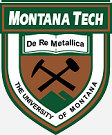Difference between revisions of "Grant information"
From Montana Tech High Performance Computing
(Created page with "Both the HPC cluster and the 3D data visualization system were funded by the state of Montana and are available for MUS researchers and educators. Montana Tech. currently pays...") |
(No difference)
|
Revision as of 13:43, 19 September 2017
Both the HPC cluster and the 3D data visualization system were funded by the state of Montana and are available for MUS researchers and educators. Montana Tech. currently pays for system support. We hope current and future researchers will incorporate the facilities into their grant proposals to fund system expansion and future support.
You can use the below HPC information in your grant proposal.
Montana Tech has a 22-node high performance computing (HPC) cluster for faculty and student research use. The system includes 25 TB of storage for storing large data sets and simulation results. Two of the nodes include three NVIDIA Tesla K20 graphical processing units (gpu), which adds 7488 CUDA cores on each node for additional processing power. A full-time HPC Application Scientist is available to help new users get setup on the system and assist them in their computational research. The HPC system is remotely accessible and available to all MUS faculty and students. The system is being used for a variety of projects from computational material modeling at the atomic level to grizzly bear population modeling in the greater Glacier National Park area. Software packages that are available for research and student use include COMSOL, Matlab, NAMD, LAMMPS, and R.
Both modeling simulations and informatics results in a large amount of data that needs to be stored and analyzed. Data visualization is an effective tool to help analyze and communicate numerical research results. Montana Tech has two 3D data visualization systems with a variety of visualization software packages. Both 3D visualization systems use stereo projection, shutter glasses, and a tracking system to enable a researcher to directly interact with the 3D imagery. Some of the available software includes Arc Scene for GIS data, LidarViewer, Google Earth, VisIt, and VMD for molecular dynamic data.
